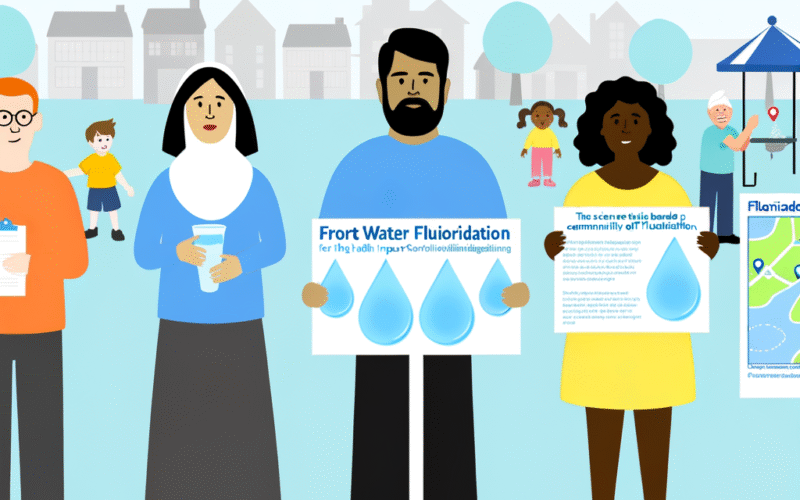Have you ever wondered what’s actually in your tap water? Most of us just turn on the faucet without giving it a second thought. But across the United States, a heated debate is bubbling up about one particular ingredient—fluoride. More and more communities are questioning whether fluoride should stay in our drinking water, and some are even pushing to have it banned altogether.
What Is Fluoride and Why Is It in Our Water?
You might remember learning about fluoride at the dentist’s office. Fluoride is a mineral that’s been added to public water supplies for decades. The idea is simple: fluoride helps prevent tooth decay. In fact, this practice has been hailed as one of the top public health achievements of the 20th century. The Centers for Disease Control and Prevention (CDC) estimates that millions of Americans have benefitted from fluoridated water.
But if fluoride is so great for our teeth, why are so many people now opposed to it?
The Growing Movement to Ban Water Fluoridation
Over the past few years, pushback against water fluoridation has been growing. From coast to coast, towns and cities are reconsidering whether to keep adding fluoride to their water. Some recent examples include:
- Portland, Oregon—voters have repeatedly rejected proposals to fluoridate their water.
- Burlington, Vermont—residents are debating whether to end fluoridation after decades of use.
- Other communities nationwide—similar discussions are happening in places big and small.
This movement didn’t arise overnight. Instead, it’s the result of changing ideas about health, greater access to information (and misinformation), and a growing desire for personal choice over public health decisions.
Why Are People Worried About Fluoride in Water?
So, what’s behind this fluoridation controversy? Here are some reasons people want to ban fluoride from their tap water:
- Health concerns: Some worry that too much fluoride can cause health issues, such as dental fluorosis (white spots on teeth) or even more serious conditions.
- Skepticism about benefits: With improved dental care and widespread use of fluoride toothpastes, some argue that adding it to water may no longer be necessary.
- Personal freedom: Many believe that adding any substance to public water supplies—without the option to opt out—takes away their choice.
- Mistrust in authorities: Growing skepticism of government, especially when it comes to health mandates, plays a big role.
Many folks point to the principle of consent. Think about it: would you be comfortable if your morning coffee automatically included a vitamin supplement, whether you wanted it or not?
What Does the Science Say About Fluoride?
Here’s where things get tricky. Most major medical organizations, like the CDC, American Dental Association, and World Health Organization, support water fluoridation. They say it’s safe and effective in preventing cavities—especially for folks who may not have easy access to dental care.
But some recent research—and lots of online chatter—raises questions. Opponents of fluoridation cite studies that suggest links between high fluoride levels and health risks, such as thyroid problems or lower IQ in children. Experts caution, though, that these studies typically involve much higher fluoride levels than what’s found in U.S. water supplies.
Trying to Sort Fact from Fiction
Separating myths from facts isn’t always easy. Misinformation spreads quickly online, and not all sources are created equal. I’ll be honest—I’ve had conversations at neighborhood gatherings that made me want to fact-check everything when I got home!
If you’re worried or simply curious, the best approach is to check reputable sources, ask your healthcare provider, or even contact your local water department. You might be surprised by what you find.
Is Water Fluoridation Still Needed?
This is a big question. When water fluoridation began in the 1940s, it was a game-changer. Dental care wasn’t as advanced or accessible, and tooth decay was much more common. But times have changed. Today, we have:
- Better dental care for both kids and adults
- Fluoride toothpaste and mouth rinses
- Raised awareness about oral hygiene
Does that mean we no longer need fluoride in our water? Opinions are mixed. For some, it’s a valuable safety net. For others, it feels like an outdated practice—kind of like requiring every car to have a cassette player.
What Happens When Communities Remove Fluoride?
Interestingly, when a community votes to end water fluoridation, the impact isn’t always what you’d expect. Some places have seen an increase in cavities, particularly among low-income children. In others, there’s been little noticeable change. The effects can depend on resources, access to dental care, and even diet.
It’s worth noting that removing fluoride is not as simple as flipping a switch. There are costs involved, legal hurdles, and public health campaigns to navigate.
How Can You Get Involved?
The question of whether to keep or ban fluoride isn’t just for scientists and politicians. If you care about what’s in your water (and who doesn’t?), you can:
- Attend local town hall meetings or city council sessions
- Read up on both sides of the issue
- Talk to your dentist or doctor about your family’s needs
- Vote on local measures or referendums related to water fluoridation
At the end of the day, the debate over fluoride boils down to one central question: Who gets to decide what’s in our drinking water? And how do we balance public health with personal freedom?
The Bottom Line: Staying Informed Matters
The fluoride debate isn’t going away anytime soon. Whether you’re passionate about dental health, personal liberty, or just want to make an informed choice, it’s worth paying attention to what’s in your glass. And hey, if you’re anything like me, you’ll probably double-check the next time your city holds a meeting about water quality!
If you’ve ever wondered why your neighbors are suddenly talking about fluoridation bans, now you know. It’s not just about science or safety—it’s about who we trust with our health. So, the next time you grab a glass of tap water, pause and ask yourself: what do you want in your water?
“`








